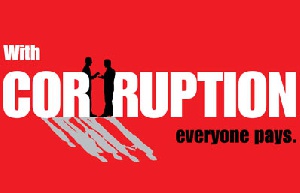In spite of on-going efforts aimed at ensuring transparency in fiscal management and procurement processes, there is increased perception of corruption in the public sector among both economic and social commentators and the general public.
This perception is indeed being borne out by independent surveys and reports.
One area which remains vulnerable to corruption is the award of public contracts where companies are said to be making informal payments to public officials in order to secure government contracts.
A recent World Bank Enterprise Survey report revealed that more than 60% of companies in the private sector when interviewed reported being expected to give bribes.
Suppliers and contractors seeking to supply goods and services to government have had to make unofficial payments as a condition to secure contracts.
The value of gifts given is estimated at over 8% of the contract value, implying then that it eats into the profits of the companies.
“We are all aware of what happens when a percentage is taken away from a contractor. He has no choice but to deliver with the little that he is left with. Such contractors will have to charge prices which leave them with marginal profits and so if you take any percentage from him as bribe, then obviously you are not going to get value from that particular procurement,” says an official of the Public Procurement Authority (PPA).
The Enterprise Survey is a firm –level survey of a representative sample of an economy’s private sector. The surveys cover a broad range of business environment topics including access to finance, corruption, infrastructure, crime, and competition and performance measures.
This confirms the Global Corruption Report for 2009 authored by Transparency International, which reported grand procurement related corruption where contracts were awarded to companies affiliated with the ruling party.
Economic experts concerned about corruption in the award of contracts as well as other sectors, attribute the development to the lack of transparency in Ghana’s fiscal processes and the weaknesses inherent in the ability of accountability institutions to fight the canker.
Delivering the inaugural Kwadwo Baah-Wiredu Memorial Lecture in Accra last Thursday, economist and Member of Parliament for Wenchi, Professor George Gyan-Baffour wondered what the accountability institutions were doing to deter corruption.
The lecture was titled ‘Fiscal policy accountability and transparency as instruments for effective national development.’
According to Prof. Gyan-Baffour, Ghana has made substantial efforts to improve fiscal transparency. The introduction of comprehensive financial management legislation -the Financial Administrative Act of 2003 and its accompanying Financial Administrations Regulations (FAR)- has been coupled with the creation of a centralized internal audit agency in 2004 which allows for early audits of activities of government.
He reckons that since public procurement accounts for a large proportion of the national budget, the introduction of Public Procurement Act (PPA 2003) in 2004 was a major step towards transparency in public resource spending.
The PPA was enacted to harmonise various guidelines for public procurement, bringing them into line with international standards and helping to curb corruption.
Even though Ghana’s Procurement Act was enacted on the principles of transparency, accountability, efficiency, economy and sustainability, there is growing perception that contracts are awarded not on the basis of factors including competence through evaluation criteria of specification, personnel, resources, experience, financial capacity and equipment holding but rather on the basis of connections.
The Ghana Anti-Corruption Coalition (GACC) is one body that has advocated the need for open contracting in all spheres to ensure transparency and accountability in the award of contracts.
The Coalition’s Executive Secretary, Mrs. Florence Dennis, makes a strong case for community participation in contract processes, adding that “these are contracts that our governments sign on our behalf. The whole idea is that if you want more transparency, more accountability, and more value for money, then these contracts that are signed on our behalf should be made open. There should be disclosure and participation in some of these contracts.”
Government spends over 70 per cent of its budget after emoluments on procurement of goods, works and services every year.
These include the procurement of simple items like syringes for hospitals and books for schools to the big construction of roads, bridges, hospitals, dams and the engagements of various consultants who are paid millions of Ghana cedis every year.
In all these, contracts are signed with providers for their delivery.
It is estimated that public procurement is responsible for up to two-thirds of the supply contracts executed by corporate Ghana each year.
“Transparent procurement procedures could reduce bribery and corruption practices in Public Sector Procurement’’ says Head of Human Resource and Administration at the Public Procurement Authority (PPA) Ms. Yvonne Vanderpuye.
The Coalition has recently launched a guide to promote contract disclosure and participation in public contracting.
This, according to the Coalition, is to trigger better contract performance and improved development outcomes.
Ms. Vanderpuye observes that open contracting would help increase community participation in selecting and monitoring the procurement process to the point of contract award, and subsequently contract execution until project closure.
Stressing on project closure, she notes “We realise that most times contracts are awarded, and everybody goes to sleep but the mandate of the PPA is to ensure that entities continue monitoring projects until they are fully closed.”
For goods, the expectation is that until the goods have been delivered into stores and received according to the contract awarded, the contract is not completed.
For works, “We expect that we will monitor the project until it is completed and then show keen interest in what happens during the defect liability period.”
How many times have we not sat back only to complain about the kind of roads constructed and facilities or goods supplied to the public which do not meet the requisite standards but for which we have the power to ask all the questions or to compel service providers to deliver according to prescribed specifications or terms of reference.
“If one road is poorly constructed, over tens of thousands of people can get involved in accidents on that particular road; one supply of poor drugs to a hospital can lead to more deaths than any of us can ever anticipate,” PPA says.
The PPA points out that “Our collective monitoring of the process of selection and execution of contracts is critical to securing excellent value for the monies we spend.”
To promote transparency and accountability in the award of government contracts, the PPA is in collaboration with the GACC adopting new strategies, a key component of which is the listing of all tenders online.
The process is part of a pilot e-procurement project which provides a common platform for use by public institutions in public procurement and public financial management, and enhances competition by facilitating increased participation of service providers for government contracts.
The e-procurement project which is funded by the World Bank is part of an e-Ghana project to introduce electronic transaction into government business.
The introduction of the e-procurement system is expected to bring a major relief to contractors and suppliers who are often robbed of the genuine opportunity to win bids for contracts they tender.
The system will also check rampant corrupt practices which emanate from the involvement of human interface in the procurement processes.
General News of Sunday, 16 March 2014
Source: The Finder
Corruption deepens in public sector
Entertainment












